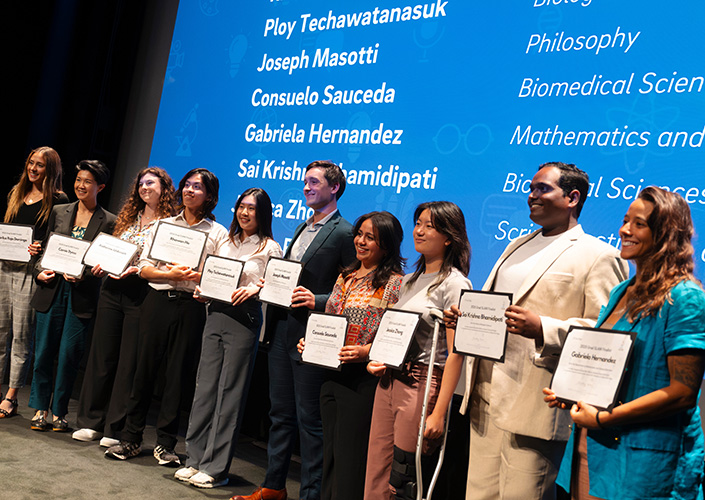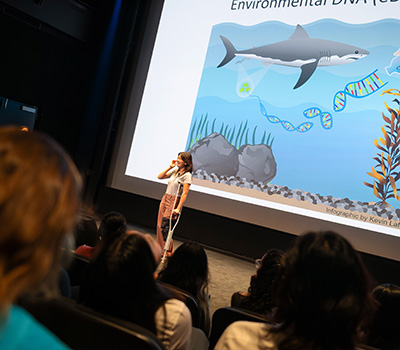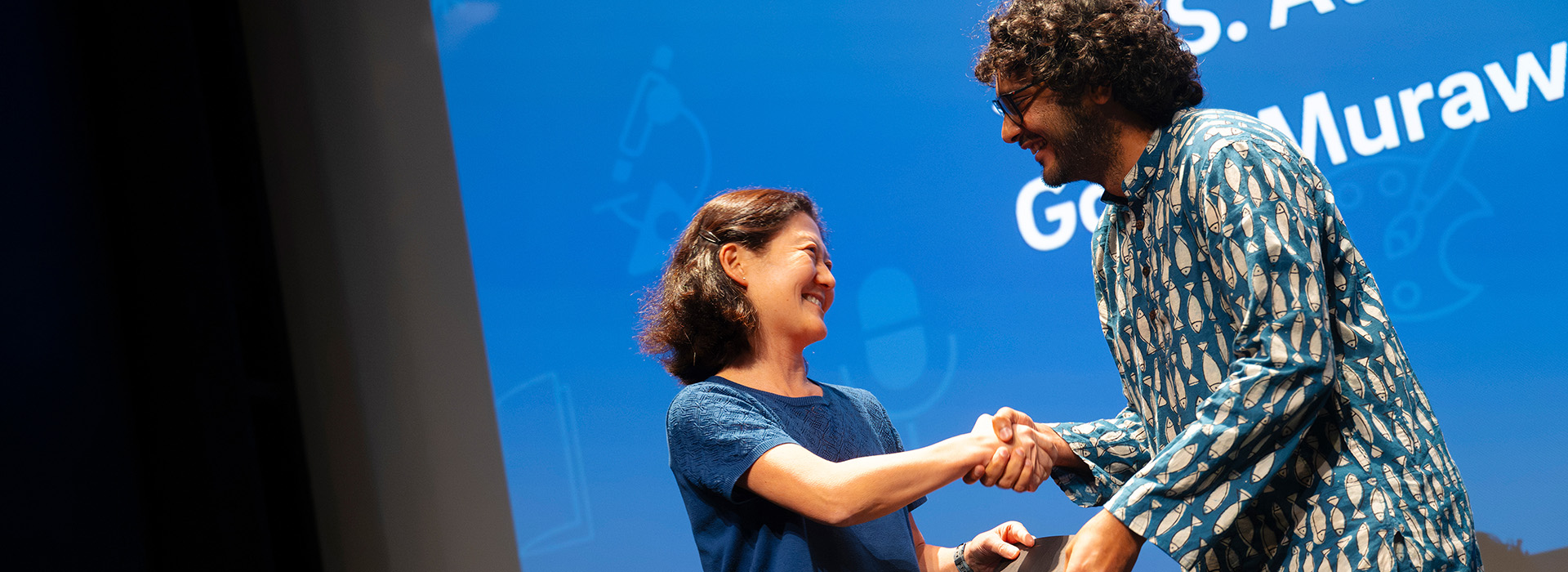From Ocean Predators to Ancient Viruses: Grad SLAM and Postdoc PITCH Winners Announced
Grad SLAM campus champion Jessica Zhong to advance to UC Final Round on April 29
Story by:
Published Date
Story by:
Topics covered:
Share This:
Article Content
Scripps Institution of Oceanography graduate student Jessica Zhong doesn’t need nets, cameras or electronic tracking devices to hunt great white sharks. Instead, she uses bags of seawater. Zhong has mastered the art of tracking the elusive and powerful predators using environmental DNA (eDNA)—genetic traces that sharks naturally leave behind in ocean water.
Her innovative and non-invasive shark-tracking method won over the judges and the crowd at UC San Diego’s 12th annual Grad SLAM on April 9, earning her the title of 2025 Grad SLAM campus champion and a $5,000 prize.
Grad SLAM is an annual competition challenging graduate students to distill their complex research into compelling three-minute presentations that are easily understandable by general audiences. Zhong will now advance to represent UC San Diego at the UC Grad SLAM Final Round in Sacramento on April 29, where she will share her pioneering marine conservation approach in a square off against first-place winners from other UC campuses for the systemwide title.
This year's UC San Diego event also introduced the inaugural Postdoc PITCH, a parallel competition tailored for postdoctoral researchers. Aalok Varma, a postdoctoral fellow in the Department of Neurosciences at the School of Medicine, secured the first-ever Postdoc PITCH grand champion title and a matching $5,000 prize with his engaging talk, “Ancient Octopus Viruses—on the ‘EVE’ of Discovery.” Varma’s research delves into ancient viral DNA, known as endogenous viral elements (EVEs) found within cephalopods such as octopuses that hold promise for advancing gene therapy techniques.

Judy Kim, interim dean of the Division of Graduate Education and Postdoctoral Affairs, opened the event by recognizing the invaluable contributions graduate students and postdoctoral scholars make at UC San Diego.
"You are essential to our campus community," Kim said. "Your creativity and intellect greatly enhance our research capabilities, and your roles as teachers, mentors and role models positively impact the educational journey of so many."
Zhong was selected as this year’s Grad SLAM campus champion by a panel of four judges from UC San Diego and the San Diego community. She competed against nine finalists who represented fields from across campus after being selected from dozens of video submissions. The finalists’ three-minute TED Talk-style presentations touched on topics from rethinking the brain’s traffic control system and addressing cloud data breaches to the philosophy of AI-generated art and combating treatment resistance in neuroblastoma.

Joseph Masotti, a graduate student in the Department of Philosophy took second place in this year’s Grad SLAM Competition and was awarded a $3,000 cash prize for his talk entitled “Is That a Picture of You? AI-Generated Images and the Philosophy of Art.” Mariluz Rojo Domingo, a graduate student in the Department of Bioengineering, was awarded the third-place title and a $1,500 cash prize for her presentation on “When Cancer Looks Innocent: Teaching MRI Who to Flag.”
Varma was selected as the Postdoc PITCH champion by a separate panel of judges after competing against six other finalists. Natasha Anita, a postdoctoral fellow in the Department of Neurosciences at the School of Medicine, took the second-place title and a $3,000 cash prize for her talk entitled “An Ounce of Prevention: Repurposing Diabetes Drugs to Outsmart Alzheimer’s.” The third-place title went to Karina Cunha e Rocha, also a postdoctoral fellow in the Department of Neurosciences, for her presentation “Fake News as Therapeutic Strategy.”
All competitors received extensive preparation for participating in Grad SLAM and the Postdoc PITCH, including coaching sessions hosted by the Division of Graduate Education and Postdoctoral Affairs aimed at refining their presentations for broad appeal.


That training shone through clearly in Zhong’s animated talk highlighting her groundbreaking approach to tracking great white sharks in the world’s oceans.
"Grad SLAM has made me much more comfortable with public speaking and renewed my excitement for sharing my research with the public," Zhong said after learning she had taken the top prize. "Scientists often underestimate how interested people are in our work. I've discovered just how excited people can become when they learn about new ways to protect ocean life."
Tracking Sharks with eDNA

Conducting her study for the past three years at a known white shark gathering site off of Año Nuevo Island near Santa Cruz, Calif., with a team of researchers from the Block Lab at Stanford University, Zhong and her team filtered and analyzed dozens of seawater samples.
“The results were astounding. We were able to detect white shark DNA in 85% of our water samples,” Zhong said. “With eDNA, we can now monitor these sharks much more broadly using much less effort. Think about what this could mean. Not just for sharks, but for biological conservation world-wide. A single 2-liter bag of seawater contains nearly infinite potential.”

Ancient viruses, modern cures
Varma said he was enticed to participate in the first-ever Postdoc PITCH competition to improve his ability to share his research with the public in a way that is easily understandable. He currently volunteers for a group called Taste of Science in which scientists give engaging talks about their research at local breweries.
"Being able to distill my research into a brief, accessible talk is incredibly challenging, but it’s crucial for scientists to effectively communicate our discoveries to the wider public," he said.
Stay in the Know
Keep up with all the latest from UC San Diego. Subscribe to the newsletter today.




